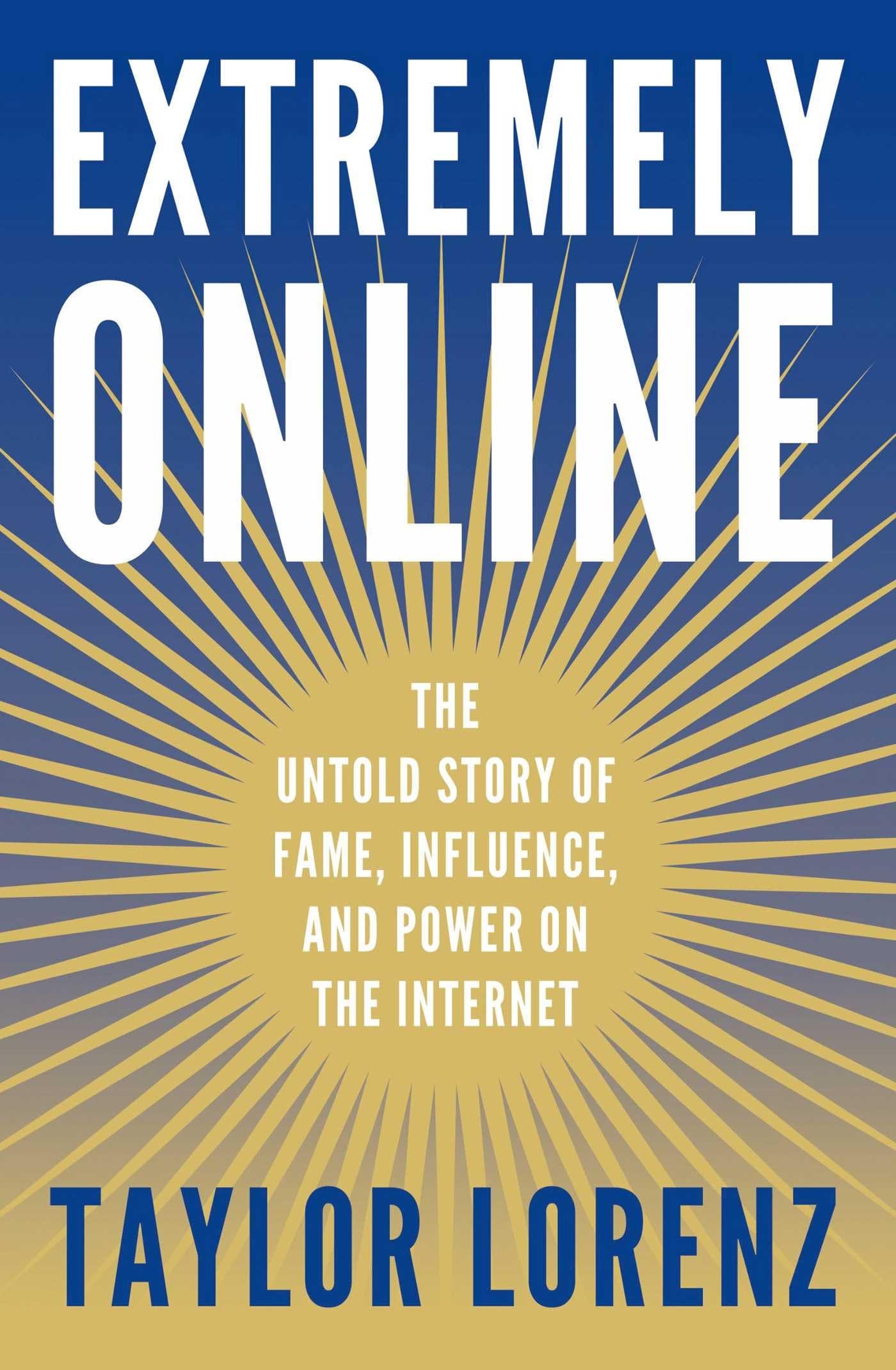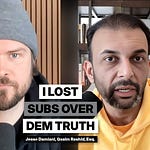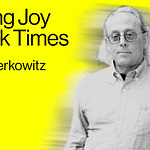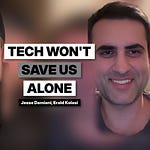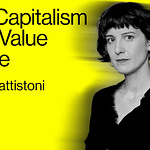Welcome to the Urgent Futures podcast! This podcast tries to clarify the chaos, from culture to the cosmos. Each episode, I sit down with leading thinkers for big idea dialogues about the research, concepts, and questions that animate their approaches to reality.
🎥 YouTube:
Today I am chatting with Taylor Lorenz, Technology Columnist for The Washington Post and author of the forthcoming book, Extremely Online: The Untold Story of Fame, Influence, and Power on the Internet.
Taylor Lorenz is a technology columnist for The Washington Post's business section covering online culture and the content creator industry. She was previously a technology reporter for The New York Times business section, The Atlantic, and The Daily Beast. Her writing has appeared in New York magazine, Rolling Stone, Outside magazine, and more. She frequently appears on NBC, CNN, MSNBC, CBS, and the BBC. She was a 2019 Knight Visiting Nieman Fellow at Harvard University and is a former affiliate at Harvard's Berkman Klein Center for Internet and Society. More bio information can be found here.
Taylor's work hits one of the main goals I have in doing a podcast in the first place. I started Reality Studies because, over the past few years, I realized that a lot of us were asking variations of the same question: What happened to reality? And of course follow-ups of how and why did it get so weird? Are we living in a simulation?
So I started researching these questions and even if I wasn't going to be able to answer them I wanted deeper context for them. I've written about some of the fruits of this research in the newsletter, but the podcast is a place to spotlight the folks who are doing the critical work of identifying and translating cultural shifts. Taylor epitomizes this.
For years, she's been finding the niche corners of the internet and tech culture that the rest of mainstream media isn't taking seriously or outright dismissing. Her stories have documented how the commodification of attention has brought about new power structures, new economies, new creative ecosystems, new celebrities, and her book, Extremely Online, is out next week (Oct. 3).
With Extremely Online, Taylor looks back more than 20 years to the early aughts to the days when bloggers first began to reshape our understandings of media, all the way through the present moment, when TikTok has become a medium for activists and political speech. Like her reporting, the book sidesteps the conventional hero narratives of Silicon Valley giants, instead foregrounding the stories of platform users and lesser-known innovators whose contributions have had deep impacts on our lives—which are now, of course, extremely online.
Find the episode transcript below (edited for length and clarity):
Jesse Damiani: Taylor, thank you for being on the Reality Studies Podcast.
Taylor Lorenz: Thanks for having me.
JD: I'm really excited to talk about Extremely Online with you today. And the first thing that comes to mind with this book is a structural question. The history unfolds across a series of precedents that seem kind of obvious in hindsight—like the fact that YouTubers would need agents and security and sort of be treated like regular celebrities—but that wasn't necessarily clear early in the trajectory of creator culture. So these were like social experiments that were occurring in real time. What have you learned about creator culture in mapping these precedent-setting moments?
TL: Yeah, well, one thing I learned is that the media is always kind of wrong and behind. It was funny to go back and read mainstream media news articles about the Internet and, literally I would say for the past 25 years they have downplayed it and minimized it every step of the way—not even just about creator culture but sort of everything and it was just interesting to reread it and just be like, God, time and time again, they keep getting it wrong, or they misread why something is compelling.
I found actually that the most useful kind of coverage of that industry when I was doing my research was just not the mainstream media, it was more like blogs or some digital media and just kind of individual people that just wrote a lot about the times.
It was interesting also how the industry evolved; it used to be very platform-specific. I write about this in the book, but, after Vine died, you see this era of multi-platform creators. So it's just interesting how one little event could have ripple effects across the industry.
JD: My first real entry into social media was MySpace—and when I was reading this and seeing the different waves and the different ways that different companies either succeeded or didn't, I wondered: do you think these events were preordained to happen the way that they did? Or were they the type of things that were just circumstantial and we could have lived in a world where MySpace would have been the main player in the social media game?
TL: I think, you know, so much of it’s about timing. I think MySpace was so ahead of its time. This is another trend that I saw in writing is that there were these people who were so early, and actually saw the future before anybody else. I think MySpace's vision of the future and how they talked about entertainment and media is 100% basically the way TikTok talks about it now—MySpace had MySpace TV but it was still very web-based back then.
They were thinking about social media how it would be thought about in 15 years, but they were trying to build it at this time when being online itself was still very stigmatized and weird and people didn't necessarily want to add a lot of friends online; that wasn’t the norm yet outside of teenagers and people our age who thought it was cool. The technology itself and the social norms had to change for the right products to take off. I would say it’s 50% right place-right time, because there were a lot of people I think would’ve been very successful if they had just been a little bit later.
JD: One thing that we take for granted now is this (very contested) notion of cancel culture, but you referenced this early moment from 2002 with the ‘Internet's First Scalp.’ I'd love if you could share what happened there and what you see it communicating about this clash between old and new media formats.
TL: Yeah, I talk about Josh Marshall, who was an early political blogger. He worked at the American Prospect by day, but he would blog by night at Talking Points Memo, which is now actually his independent media company. It was a birthday party for Strom Thurmond. There was a toast given by Senate Majority Leader at the time, Trent Lott, who basically made a bunch of praise for some of the worst of Strom Thurmond's ideologies and seemed to support segregation.
And this was something that went over the heads of a lot of inside political writers in the mainstream media, who kind of ignored those comments and just wrote a quick item about the birthday celebration.
But Josh noticed that comment, he pulled it out, and he did what bloggers do best, which is do like 20 posts on it, and relentlessly cover it until Trent Lott was forced to resign. The New York Post ran a headline that was titled, “The Internet’s First Scalp,” and it was about how people on the Internet, specifically bloggers and Josh Marshall were able to get Trent Lott kicked out of office. There were so many examples of things like this, actually, I really just liked that headline—and because it affected our entire political landscape. But you saw these little moments time and time again of the insurgent power of people online to have real meaningful change and to circumvent the mainstream media and up-end politics, fashion, sports, you name it.
JD: This history really looks at the past two decades, and this period is this crucible in which social media is forged. There are countless instances where the “old guard” has totally dismissed or tried to bypass social media platforms and practices. Toward the end of the book, for example, you reference venture capitalists trying to use their positions with startups like Clubhouse to burnish their own brands as influencers, but then Clubhouse didn't necessarily find the success that they were hoping for. Has this dynamic just repeated itself again and again, or have you found that the old guard ever gets savvier?
TL: Yeah, it's very funny because I think venture capitalists learn that you cannot force specific people to be popular on your platform, which Elon is learning today. You can try to force-feed these people down other people's throats and you're going to lose users that way. Clubhouse found that out the hard way.
My book ends a couple years into the pandemic, that's when everyone was really forced, obviously, to all be extremely online, and that's when a lot of institutional powers were forced to take it seriously, because suddenly everyone was online. And they were like, “Wait a minute, what's happening over here? This world we've ignored for literally 20 years…maybe there's something here.”
So you saw VCs pour money into the dumbest startups alive, to be honest, because they had ignored it for decades, and then they were funding things that nobody wanted or needed—also there's already this robust half a trillion dollar industry that they just ignored.
I was talking to a friend of mine who's a VC, and she read the book as well, and she's like, “Not all VCs,” and it's true, like The Chernin Group invested in Barstool Sports early and a bunch of other creator-driven media companies—but they're not generally the Silicon Valley tech VCs, who are notorious for coming in at the last minute and trying to make money off something they have no idea about. I think they’re all in AI world right now. So it was just kind of funny to see they had missed the boat on that so badly, because the ones that did get into it in 2010, or even 2007, and recognized this stuff early, they made a lot of money.
In terms of traditional media: I work in traditional media and I can tell you they absolutely do not get it at all. I think they've tried a little bit more and they recognize that they have to use the internet. There are people within these institutions that are brilliant and amazing; it's not really the workers, it's the management that sort of is just very slow to sort of grasp that it’s not the nineties and they don't control the media. The media is the internet now. The media is not the New York Times and The Washington Post—for good or bad. There's a lot of pluses and minuses to that.
[MySpace was] thinking about social media how it would be thought about in 15 years, but they were trying to build it at this time when being online itself was still very stigmatized and weird … a lot of people I think would’ve been very successful if they had just been a little bit later.
JD: Would you be willing to share a little bit more about like, you're somebody who kind of dances across both of these worlds, like, when you're thinking about your work of covering creator culture, and in some ways, sort of adopting creator tactics, while also being somebody who's a columnist at, I mean, your pedigree is all these major media organizations. How are you thinking about that, that balance?
TL: Yeah, I am very much from the internet and I always sort of care about the internet more than I care about traditional media. But working in traditional media has been so interesting, because I've really seen why they can’t catch up. I used to write a lot of really negative things about the mainstream media when I was a blogger, and now that I work in it, I have a lot more empathy for it, for the people inside of it. Again, it's generally not the reporters. It's this management level; it's the same as in Congress. Our whole country is like run by this gerontocracy that refuses to give up power and is not with the times, and that's true for media, it's true for politics, it's true for literally name any industry—so I think there has to be some turnover before anything really changes.
JD: So you referenced blogging. One thing I was really struck by early in the book that I maybe peripherally understood, but you bring into focus, is the impact of “mommy bloggers.” Your book is chronicling the commoditization of attention as power and mommy bloggers are this first kind of, I don't know, flashpoint in that trajectory. Could you share a little bit about the role that mommy bloggers have played?
TL: Yeah, I would say they were like literal mothers to this whole industry. It's kind of crazy. I think a lot of people think of the creator industry as like YouTubers, or beginning with YouTubers, and that's not true. It really began with bloggers and specifically mommy bloggers, because mommy bloggers—which itself is this very fraught term that some women came to embrace and a lot of other women felt was deeply misogynistic—they dealt with so much misogyny and hate for what they were doing. But as I mentioned, there were these other bloggers, especially in tech and politics, that were getting lauded and able to get attention online, people like Josh Marshall. And then you had moms, a lot of mothers, basically a whole generation of Gen X mothers that were shut out of the workplace and turned to blogging to express themselves. They were the first to build a personal brand online and then monetize it. And they were just brutalized for it. People were just so angry that mothers would make money online. It was like this notion that motherhood was so sacred and like, ‘How could you monetize your life as a mother?’
They were attacked as being attention seekers. Like, ‘Why do you have to blog about your life?’ You know, ‘Why aren't you just happy at home? You should be cooking for your children, why are you on the Internet?’ The thing is, the Internet was such a lifeline for these mothers because motherhood is incredibly isolating and women's media at the time was deeply misogynist. I went back and read so much women's media from the ‘90s and Aughts for this book and it was just disgusting. It's actually like bizarre; stuff from 2005 reads like it’s from the 1950s.
Mommy bloggers were the ones that normalized things like postpartum depression, and, you know, not always loving your kids, and just having a hard time, struggling, coping with addiction, turning to wine during playtime to make it through, hating your husband—just all these taboo topics that had never really been expressed in traditional media, mothers were able to go online and talk about and then make money, supporting themselves through it. So it was just really liberating and fascinating.
JD: And you reference some highly visible misogynistic moments, like with Julia Allison and other women throughout the book, which is a parallel stream to women and femmes being the ones who often were the innovators of particular cultural and social practices. Can you talk a little bit more about that dynamic?
TL: Yeah, this whole industry was built primarily by women and then secondarily other people that were basically marginalized, a lot of LGBTQ people, people of color, just people that would have never ended up in mainstream media. That's who fostered this whole blogging ecosystem and then really used the Internet very early to monetize. I don't get it into it in my book because it was so niche and separate from this main industry, but sex workers were also really early adopters of the internet and online monetization. I talk about that later with OnlyFans, which I think was the first true creator-driven sex work platform.
But yeah, it was just all women and people were obviously livid at it because I think since the beginning there's just been this deep misogyny against women and women's work and women's role in society.
JD: You also brought up BIPOC creators; 2020 was this big year of reckoning around systemic oppression broadly, but within the creator subsection it was also a moment of reckoning around people of color being exploited and extracted from in social media platforms. Could you A) describe that for listeners, and then B) I'm curious what you've observed, you know, it's been three years now, what movement or not you’ve seen on that front?
TL: Throughout the Aughts and 2010s, you had a lot of viral moments coming from people of color, I talk about Tay Zonday, Adam Bahner, in my book, who wrote the “Chocolate Rain” song, and there's Peaches Monroee, who created the phrase “on fleek,” and so many vines specifically, there was just a lot of obviously, culture, created from those communities.
And then in 2020, obviously, there was this big reckoning and people started to talk about credit and ownership. I talk about Jalaiah Harmon, who made the “Renegade” dance, who was a story that I wrote about this 14 year old that made one of the biggest dances on the internet and also never got credit until we wrote the story for the New York Times, basically. And so, there was this moment when people started to go like, “Oh, actually we should pay these people.” Unfortunately, as with every other bit of progress that was made in 2020, it flipped back very hard the other way. And now almost no one cares—there’s no discussion of it at brands. I saw a chart released by some company recently where they show spending on creators of color has gone down from pre-2020 levels. So they're in sort of a worse position than they were previously. I think unfortunately that's just the case with all the social progress that was made in 2020. I've talked to people about why this is, and it’s because, for so many reasons, but there was no sustained pressure. Nobody wanted to make systemic change. A lot of people wanted to talk about it because it was trendy at the time, but nobody actually wanted to change the system. So we have a worse system now, which sucks.
The reason I end the book where I do, which is in 2022-ish, is because I think that was the end of a certain chapter of social media.
JD: Related to that, another thing that really emerged in 2020 was TikTok as a vector for political communication, both from politicians externally, but more predominantly people spreading political messaging and fostering information ecosystems. When you bring up progress, how are you feeling as we're heading into another election year, with TikTok as strong as it ever was and more vehicles for video-based messaging?
TL: TikTok has always been such a really important platform for activism and activists, especially youth activism, young people who want social change have leveraged TikTok very effectively. I think that's why you see all these Republicans embracing it—Vivek Ramaswamy was out with Jake Paul on TikTok the other day—so it's just going to play a bigger and bigger role in our political system because it's the default social network for millions of young people.
I always describe TikTok as a combination of Twitter and YouTube, where there was all this like academia and like political discussion and actually a lot of smart people and journalists and stuff. Actually, not as many journalists as Twitter, but you know, there's enough like media on there—and then also with YouTube culture where it's very video based. Commentary culture is really huge on TikTok. So I think it’s just going to play a bigger and bigger role in our election cycles. Not the platform itself. People like to think that it's being programmed by China or something. It's not, or there's absolutely no evidence of that. I just mean people leveraging the platform, activists and people leveraging the platform to get the word out about whatever they're trying to talk about.
JD: So this is not in the book, but, just to piggyback off that question, because I've seen you speak about this elsewhere and I'd love to discuss it with you. There's a lot of geopolitical positioning around TikTok in particular. What do you make of that relative to the sort of Western tech giants?
Yeah, it's so hilarious to listen to these people talk about TikTok as if it's the greatest threat when we have Facebook here in our own country. They're worried that TikTok could potentially, you know, disrupt an election, when we have actual evidence that Facebook has done that many, many times. They're worried that Tiktok could like, lead people to violence when we have so many examples of Facebook facilitating genocide in other countries. It's like all of the stuff that they're accusing that TikTok might do, that there's no evidence TikTok has actually done or facilitated, we have overwhelming with so many examples of Facebook actually doing those things and actually facilitating those things. So it's just like, ‘Oh, but it's fine because it's America.”
Also, by the way, the whole data privacy thing is such a farce. If they cared about data privacy, they would pass comprehensive data privacy reform. But if you shut down TikTok tomorrow, first of all there's still so many other Chinese apps and gaming, which is the bigger form of entertainment than anything else and is like half-owned by Chinese companies. So I can't even get into that, but like, also: China could buy our data from a third-party Facebook vendor. We have no data privacy. So if you're actually caring about data privacy to the extent that you want to shut down an app, make such an unprecedented decision, then you should actually pass a lot more comprehensive data privacy reform before anything like that ever even happens. But of course, they don't want to do that. They just want to make a political bogeyman. And it is this place for young progressive activism, that's why you see the Republicans and right-wing parties wanting to shut it down, because it's a place where young people congregate and push a lot of progressive ideology.
JD: You prompted me to think about that report from the Wall Street Journal about Facebook knowing that Instagram was detrimental to adolescent women's mental health. And mental health comes up in Extremely Online as well, with this metrics game-the-algorithm culture, which I think would have felt really foreign if you'd rewound to the nineties and talked to the techno-utopians and said, “People are going to feel so strung out because they're running on this hamster wheel, and that's one of the primary effects of these platforms.” Could you share a little bit about, some of what's happened relative to mental health on these platforms and among creator communities?
TL: These platforms basically put their creators, as you said, on a treadmill. There's no off-ramp. Being a creator is incredibly, incredibly difficult and there's almost no respect for it. There's no like institutional respect in the sense that we don't have a social safety net in this country at all. So these, these people are essentially independent contractors for these companies, but they have no benefits. They have no support. They can't take a week off without losing followers, losing money. So it's a very hard job.
And it of course affects mental health and social media. I think making metrics public was the original sin of social media. It's so negative because it puts this social pressure on everyone to like, make sure you get that extra like, or make sure you get an extra hit, a certain follower numbers, because that says something about your social value. It's just very toxic. And I don't think that the Internet is inherently toxic, or the fact that it facilitates connection, the notion of social technology, I think is not toxic. We should be more connected. I hate this idea of like, “Oh, you just have to log off and the more you log off, the more mentally healthy you are.”
I think you can spend literally 24/7 online. It's just that the way that we use the Internet and most of the platforms that we're forced to rely on right now are these really predatory ones. I wish that wasn't the case, I wish we had a much better social media landscape. But I hate that the the focus is on logging off. It's like, don't tell everyone to stop logging on. Tell everyone to like, let's build better systems to facilitate better connection. Because people's lives aren't inherently better when they log off either.
JD: Yeah, it's often discounted that this is a whole architecture of power. It's a driver of the entire global economy now. And you sort of make the point, like, even if you're not part of any, platform you'll still be in other people's photos, your footprint is still traveling around these platforms.
I'd love to talk a little bit about fandom with you. It's funny for me as a millennial, I feel like I grew up with all these platforms, and I had varying degrees of connection to them and to what was going on. I saw this stuff happening in the background, but it was kind of in the background of my everyday life. One service that I think this book provides is it really contextualizes things and gives you this 20 year history with the flashpoint moments to engage with. One thread that I saw evolving throughout is this idea of fandom. Can you describe how you've seen fandom evolve and maybe some moments, like some of the tours, that rendered visible how different, creator culture was? Or rather, how much more social capital being a creator had than people originally realized?
TL: Creators were building these fandoms online, but they were very segregated to the internet, right? People that didn't spend time online could sort of write it off, they didn't have visibility into those fandoms because they weren't spending time online. They didn't see it. So once things started to really manifest in the real world was when people started to notice. I talk about this early Vine meet up, that a bunch of Vine creators had in Central Park, and that being kind of a moment. It used to be creators meeting up with each other. There were things like the 777 Meetup on July 7th, 2007 in Washington Square Park, where a bunch of YouTubers met up. But at that time, like in, I would say 2010 and earlier, it was more about like YouTubers meeting up with each other. Even the first VidCon was still very much like YouTubers meeting up with each other, but I would say that actually the first VidCon was also this turning point because there were fans, but it was very early fandom and they had full access to the creators. There wasn't this strong delineation between who was a creator and who was a fan. It really wasn't until kind of like 2013, 2014, 2015, when you started to see these real fandoms emerge, that's when you saw tours.
You had content creators going on mall tours. Companies like Buca di Beppo even had a content creator tour. That was my favorite example because I found all their signage for it and it was so funny. Like, “Hey, look, we have like Internet stars at book Buca di Beppo, come to Buca di Beppo!” Like, what? But they were trying to capitalize on this like youth fandom. Obviously Magcon, if you guys haven't watched Chasing Cameron on Netflix, it's such a time capsule. It's a documentary about Magcon from like 2015 or 2016. Magcon was one of the original influencer tourists, it stands for “meet and greet.”
So yeah, you started to see fandom manifest IRL. And then now I think all the platforms are so big and everyone is online that it's very clear who has fans; like you see the fandom. It's become more pervasive and recognized. It used to be like, “Oh, those are just like internet fans,” and now it’s like, “Oh, it’s all the same.”
[Misogyny] was such a through line in reporting this book: all these incredible women who have been driven off the internet by hate.
JD: I remember when BeReal was having its moment in the sun, there was a lot of talk about how it was somehow not playing into some of these more complicated threads of social media. What are you thoughts on that? Do you see any other glimmers that social media is shifting toward less rankings or gamified examples, or is it really just doubling down?
TL: I would say mostly it's doubling down, but yeah, there's a lot of small viral apps that haven't proven to have staying power, but they sort of tap into something. BeReal’s an example of that. The reason I end the book where I do, which is in 2022-ish, is because I think that was the end of a certain chapter of social media.
As the pandemic has pushed everyone online, especially in 2020, I think there's a level of exhaustion. I think people today are starting to value privacy more. We've gone so far where like, we are in this mass surveillance culture where everyone just records everyone else. You know, “Oh, I see something crazy. I'm going to record it because that could be a viral moment online, because we all understand that that's a commodity now.” I think that's why you see people actually wanting to use these smaller platforms like BeReal where it's more contained or like group chat or Discord or places where you're not default sharing everything publicly and permanently. That era of social media, it's a little bit over. It's not really novel to like, have every thought be public.
I think if you want to reach everyone, you can post on these platforms, but it's more about reaching who you want to. Even TikTok is more about reaching who you want to than Instagram, Twitter, or YouTube, because the algorithm segments you and you trust that it will deliver your content to the relevant audience. Whereas all these other problems you're posting publicly and you have to build your own subscribers and it's a lot of burden on the user.
JD: Do you see part of where you chose to draw this line around 2022ish correlating it all to Gen Z officially being the “it” generation or are those two things incidental to each other?
TL: I think 2017 was the moment that Gen Z became the “it” generation. I wrote a piece that year actually about Gen Z consultants and how consulting for Gen Z stuff was taking off. That's when brands really started to flip and target Gen Z. So I think we're actually more in the middle of Gen Z; it's more just like average people have all gotten very online. The pandemic accelerated a lot of change that was happening, but now we're there. Everyone has an online footprint. Everyone's online. It's not just the kids. It's affecting politics, sports, fashion, entertainment—every single aspect of our culture is so shaped and driven by the Internet now. And so I wanted to end it there because I felt like we had reached that point. It was less about a specific generation maturing. I did see some marketing report about Gen Alpha recently and I was like, “Are we even thinking about that already?”
Like there's so many generations. One other thing that I thought was notable or kind of changed my own perception is I think as a millennial—I'm with you. I'm like smack—dab, like true millennial millennial. I had always thought that millennials were the first generation to really leverage the internet and grow up on social media, which is sort of true, but actually all those early bloggers were Gen X—like those mommy bloggers were Gen X—and even Keemstar or Ethan Klein at H3H3, like these big YouTubers, are Gen X. A lot of them are a little bit older than we think. The Internet is thought of as this thing that's driven by young people. I mean, Jeffree Star is Gen X! So many Gen Xers actually have shaped the Internet. And I think they deserve more credit. I know people say that they're always an overlooked generation, and I think their contributions to the Internet have been overlooked. I know they're cringy online sometimes, but they really did a lot.
JD: My partner's son is a Gen Alpha and there's definitely a sense that like, no matter how cool I would ever want to try to be on the internet, that I'm always going to be cringe. So I think there's this generational thing where you sort of reject whatever the previous generation did—and I wonder how long that lasts too. Because as you're describing, Gen X bust down the walls, millennials are much more platform-oriented, and now there's this proliferation of platforms, but then how different does that become in the future? That depends on a lot of factors in terms of technology and other things that are out of our ability to accurately forecast.
Thinking about your rolein this: you kind of defined the digital culture beat. It wasn't something people took seriously, before you. And now there's a whole crop of people who cite you as their main influence in this type of coverage. This being your first big book, can you talk me through a little bit of the creative process and decision-making process in picking what pieces of this puzzle to highlight? Because in some ways, there are inevitably holes, because there were so few people even covering it in the first place—so even going back to the historical work I assume was pretty complicated.
TL: Yeah, it was really hard. From 2009-on, that's when I was writing and covering things. I lived through this and I have sources, so it was easy. What was very hard was the Aughts. I would say shout out to Todd Spangler at Variety. I don't know that I could have written this book without Todd's writing. He deserves more credit. I should have given him acknowledgement; I gave it to a lot of women, but like there were these writers. Josh Constine at TechCrunch was another one. They ended up covering a lot of this stuff really early and really well, on digital media sites generally. But yeah, the Aughts were what was really hard. I had to go back and just interview so many people.
I have interviewed hundreds of people for the book, but there was a lot of what I've learned now is called link rot—which actually happened to me; my earliest, my first bylines are not even on the internet anymore because the websites I wrote for were like bought and defunct or pivoted or whatever.
I could have never written this book without the Internet Archive. Like the internet archive is such an important resource. It's so funny because Elon Musk was saying that my family owned it or something a while ago, and the founder was like, “We don't know her and we don't claim her,” But they deserve all the money in the world because the work that they're doing to preserve websites and old pieces of media is just really important because I was relying on that heavily. I opened with this story about this blog called Socialite Rank; if that wasn't completely preserved on the Internet Archive, we would not have a historical record of it. We would have, like, maybe a New York magazine article that was written after the fact that was sort of a short piece that didn't cover everything. It's just so important to have that source material.
I'll say one other thing. I'm just so glad that there's more writers now. There's not even nearly enough. I mean, there's more reporters covering Facebook—just Facebook as a company—than there are Internet culture reporters. And I think that says so much about how we view tech reporting. I wish that we had like 50 more reporters on this beat.
JD: Why do you think there's resistance? When I look at your work and when I look at Kat Tenbarge’s work, Katie Notopoulos’s work, I'm assuming highly trafficked stories. It's not as if these are not proving themselves out in the metrics. What do you think the resistance is in terms of staffing appropriately to cover these stories?
TL: It’s what comes with it. The attention that the attention is the problem. Every major story I do goes viral because I'm writing about huge personalities. I'm writing about people usually with millions of followers that are going to respond. I'm writing about things that everyone's talking about or has strong opinions on or that's trending or whatever. If you do the job well, you are in their world, right? You are in this content creator universe where it's crazy. You're operating in this new media ecosystem that's an attention driven ecosystem that's been weaponized by the worst people in the world. So you as a media company need to stand by your reporters.
This is why the New York Times—no offense—doesn't do internet culture reporting well, because they're not willing to go into those spaces and truly cover them. You have a couple of reporters that might dip in one, you know, now and then, but they don't have anybody actually covering it. That's why they cover everything like two months too late. I will say though, Jessica Roy is very good and she's been writing for them lately, and she's extremely with it, and Joe Bernstein as well, but I think it's so funny that those two writers are on the style section. That just shows how they view it, like, “Oh, it's this silly little thing over here. It's not like a core thing that's upending everything in our political landscape and economy.” I think it's just so hard for traditional media. They're very scared of the Internet. They're very scared of it and they don't know how to react when when attention is driven their way.
And they don't they don't know what to do, and the reporters themselves are often driven out of the industry. I can think of three women right now who are phenomenal, phenomenal reporters who were driven out of the industry—off of this beat specifically—because of online harassment and hate and doxing and crazy shit that they've had to deal with.
So you also have to be really good at dealing with that. And I would say, I started in this world in 2009, and I feel like—what is the metaphor of the boiling frog? Like, everything that happened to me with, like, writing about Libs of TikTok, I was like, Jake Paul fans have done this to me years before. I'm old enough too where it doesn't affect my life as much, but these young reporters, they're even more online. Their lives are even more mediated by the Internet. It's very hard for them. And if they don't have institutional support they can't do their job.
JD: I'm remembering this moment where, I think it was either right before or right after you had departed New York Times, there was this public exchange with Maggie Haberman that I found to be really telling. And it's not necessarily age or generational, because of course, as you sort of pointed out, there are very savvy and thoughtful, older reporters—but it was kind of an older sensibility about how a reporter is supposed to comport themselves and the certain types of objectivity they're supposed to maintain, and the persona—
TL: It wasn't about objectivity, though, it was about having a personal brand. First of all, I don't believe in objectivity. It's a lie. And I think Wes Lowery has written excellent pieces dismantling that notion. But yeah. I had said in an interview—actually, I was asked the question about journalists having personal brands—and I was like, yes, journalists have to have personal brands, especially on the internet these days. It's a very talent driven industry. And Maggie, who had of course 1.7 million followers, and I would say almost no one is more of a personal brand than her, especially during the Trump administration, came after me for it and said that I was an attention-seeker and all this negative stuff. I just thought that was hilarious because, look in the mirror, what are you talking about? You are a perfect example of this. You have 1. 7 million Twitter followers; don't talk to me about personal brands. But I think as you said, it's this old-school notion—she didn't have to build her personal brand. She didn't have to do any of that because she relied on the platform of the institution. Now institutions don't have power. And if you want to survive in this landscape where we're all getting laid off 24/7, which any millennial that worked in digital media or any Gen Z person can relate to, you do actually have to have a brand on the Internet. I don't think that that's necessarily a great thing because I think there's a lot of amazing reporters that don't want to cultivate it necessarily.
I talked to a friend who's actually still at the New York Times, a phenomenal investigative reporter, and he's like, “Yeah, even I have to have a personal brand. That doesn't mean that I'm on TikTok, but I'm known as this investigator and I have to be really careful to cultivate this personality around that and cultivate my image around it. You have to do that just to operate—media has always been this way. Look at Anderson Cooper. Look at Barbara Walters. Look at like any big journalist, Woodward and Bernstein, right? It's a talent business. So yes, unfortunately we have to have brands. And we all have to have brands, by the way.
JD: Yeah I was very surprised to see that as well. And just building on that, do you have a heuristic or a set of boundaries in your mind for how a reporter can maintain a certain degree of reliability and authenticity with audience that you are attempting to cover something in a fair and balanced way (not in the weaponized sense)? In terms of having a brand that participates in creator culture while also being respected as somebody covering it. Are there any guardrails you can reference?
TL: That's always been true for any culture reporter, right? It's like, of course, culture reporters that wrote about music and film or whatever, just culture in general, we live in culture, all of us do. You can't opt out of culture. And by the way, same with politics, like these political reporters like to think that, “Oh, I'm objective or I don't vote because I, because I'm a political reporter” It's like, what are you talking about? We all live in a political world. This is just the world that we all live in. I think the most important thing is to be fair and to be accurate and to be truthful. That's the most important thing. So sometimes I'm writing about somebody that maybe I don't personally love, but I'm accurate and truthful and fair, and I think it's better for me to be open and be like, “Look, yeah, I'm not personally a fan of this YouTuber or something, but I'm reporting on them fairly, and everything that's reported is truthful and accurate.” Just the way that a music writer, of course, they're not going to not listen to music and abstain from music because they have to be objective, like, they're going to like certain artists better than others, and that might shape what they choose to cover; they might want to cover a band that they really like that maybe wouldn't normally get covered or something. But, you know, it's their job to report on the industry, whether, you know, whether or not they like Taylor Swift, right? Like they're going to have to report on her tour being a huge success.
This is what I think Wes Lowery is just so good at. He wrote this excellent piece and he's more articulate than I am on it, but it's like this false idea of objectivity where objectivity is really just one ideology and set of opinions that a lot of old white rich men hold.
And that's considered the objective opinion, right? It's obviously a farce. The most important thing is to be truthful. I'm such an open book. If somebody asked me my opinion on something, I'll happily tell my opinion, but I don't let that opinion affect my work. I mean, we all decide what to cover based off things we're interested in, of course, or accountability things that we're focused on, but you know, it's so silly, all those conversations, because this has always been the case. And by the way, newspapers make political decisions all the time. Any kind of investigative journalism is inherently political, you know, if you're investigating gun violence deaths and putting together this big picture around gun violence, that says you have a specific outcome that you want.
So I think we should just be more transparent about it because what readers don't trust is when you try and say that, “Oh no, I'm a completely neutral person.” It's like, well, no one is, we all live in the world.
JD: You referenced rich white men and bias, and of course everybody's talking about Isaacson’s biography: the elephant in the room of media discourse is Elon Musk for the foreseeable future. Do you have any thoughts about where that is all heading?
TL: Yeah. I definitely was reading all the excerpts that I could because I cover Elon sometimes and I wanted to know what he'd found.
I wanted to write my book because my reporting always focuses not on those people. I wanted to write a book that was about the other side of tech, because I think so much of how we've understood the rise of social media is through these corporate narratives that center these men, like, I mean, The Social Network, right? That's the defining way that people understand the rise of social media, is through these narratives that just center Silicon Valley boy geniuses and powerful men. And every single tech book has to be like a company book. You know, we have like 10 WeWork books or we have the YouTube book and the Instagram book—which I love, by the way, Sarah Frier’s No Filter’s right behind me [referencing her bookshelf], it’s extremely good—but I think we need alternatives to that too. We need books that zoom out and tell the users’ side and look at these creators and look at the industry around it and how it's been shaped, because social platforms are very unique. They have a very symbiotic relationship with the user base. It's not like these tech geniuses just built these products and then everyone uses them how they want. In fact, quite the opposite. Usually the tech people had no idea what's going on, and a lot of them succeeded despite themselves.
So for me, I didn't want to write another tech book that was just about some, you know, powerful man or some man that fell from grace, like SBF or whatever. I wanted to write about these other people who have been basically written out of history, and tell the story of social media through a cultural lens, not just through these tech Silicon Valley narratives.
JD: I really appreciate that. And it makes for a much more, surprising and enriching reading experience. I have a few recurring, lightning-round style questions. You've answered them to a certain extent earlier, so feel free to repeat yourself. What's one thing you wish people paid more attention to?
TL: Oh God, I mean misogyny on the internet. I'm gonna say it. Because that was such a through line in reporting this book: all these incredible women who have been driven off the internet by hate and it made me sad.
JD: What's one resource you would recommend for making better sense of reality?
TL: Oh, really good question. TikTok, I think people that don't use Tik Tok should spend time on it because it is a real window into culture today. It's such a defining, important platform. I think people should check it out.
JD: What's one moment where your sense of reality was disrupted?
TL: I guess when COVID hit, I was like, what is happening? I actually had a lot of beliefs about human nature and all this stuff before COVID that I now have completely changed my mind on. I used to think people were inherently good and I don't think that anymore. I think people are inherently evil.
JD: You just feel like because of what was put on display when the pandemic came down?
TL: Actually, it was what happened after in 2020. That was a really good year in the sense that people had a lot of solidarity and seem to care about other people.
I'm severely immunocompromised and very sick. And so in 2020 was like, “Oh, people are having solidarity and clapping for the healthcare workers,” and now it’s like, “Oh, they’re banning masks and everyone can die. And we're going to have absolutely no systemic solutions to this virus that continues to maim and kill millions of people.” I lost another person I love to it that just several months ago, it's just horrible. It's horrible. And no one cares. In fact, there's real hostility, and I think a real eugenicist sort of thinking that's emerged out of COVID—which I learned is actually very common. Following the previous pandemic in 1919 as well, eugenics became this huge thing. I think we're seeing that now with this notion of vulnerable people where you can just die, like, hurry up and die because the rest of us are going to be fine. That's not true. Eventually you will get sick and die. That is true for everyone, whether it's old age or cancer or something. We all die, actually, and we all become vulnerable.
You might not be medically vulnerable now, but you will be. And so I think it's really horrifying. The public sentiment, especially from political leaders, that’s what's really scary, the normalization of that thinking. And I'm like, “Oh damn, I thought we were better than that.” Now I think everyone is sort of inherently bad and we have to build societies to facilitate good behavior among people and caring about other people. We don't have a very collectivist society. We live in like one of the most individualistic countries in the world. And I think that's why we have, outside of China, which is just so much bigger than us, the highest rate of COVID deaths in the world still right now.
JD: I remember reading—all caveats that the numbers could be off and whatever. But I remember reading something to the effect that, given the projected spread of COVID over the next 10 or 20 years or something like that, that we're essentially going to be dealing with like 20 percent of the population, in some way, large and small, affected by long term deleterious health impacts from COVID, which was really striking when you have, yeah, political leaders saying like, “It's done, let's go back to work.”
TL: Yeah, sorry to all the sick and disabled people. You can just die. And by the way, there's absolutely no safety net for you. So if you do get disabled, you are dead to the world because we're living in this hyper-capitalist society where as soon as you lose value as a worker, your life loses value.
And it's very sad to see leftists parrot at this stuff. Because no one has defended the capitalist state more than these leftists that also want to pretend that COVID is over. And it's scary because people have, like, socialist in their bio, and they're just like, “Oh, you can't work. You're useless.” It's like, “What are you guys talking about?” So it makes me very sad, it's one of the few things that I would have thought that nothing could get me to change my mind about previously. But now my mind is totally changed.
JD: Let's rewind to pre-Covid because one thing I really did want to talk about with you is, you reference in your acknowledgements how Tumblr saved your life, and also that your taylorlorenz3.0 community was really supportive in making decisions around the book. I'd love to hear a little bit about those episodes in your life.
TL: Yeah, I do think tumblr saved my life because I was so depressed before tumblr. So I got on tumblr in 2009. I wasn't really on the Internet before. I actually didn't have MySpace. I had Facebook in college, obviously, like every other person, but I wasn't really online until Tumblr and, Tumblr completely opened my world and got me everything in life. So I love Tumblr.
And yeah, I have a bunch of accounts online that are just for fun, including my like, funny meme account. I've always had accounts like that. But I just love the community that I have online and my community of followers. I'm the most indecisive person ever, so when I had to make decisions about the book, I would always do polls and stuff, and they would always give me advice and help me, and obviously they're the ones that have pre-ordered my book and really supported me throughout my career and they support my work. I'm just so grateful to anyone that follows me and engages with my work and supports my work because I couldn't do it without them, you know, so shout out to all the followers.
JD: Are there things that could happen at the level of creator culture or tech infrastructure of social media platforms that would maybe give you some more faith in the inherent goodness for humanity? Or maybe a cleaner way of phrasing the question is: what would you identify as something that's desperately needed in the social media creator ecosystems?
TL: Well, I think because people are so inherently evil and bad that we really need technology to bring out the best in us. We need technology that brings us together and helps us create community in powerful and meaningful ways, and can help facilitate true connection between people and true understanding and empathy.
Right now we have platforms that strip empathy, right? We have platforms that sew division and actually feed into the worst of human nature. My hope is that we build new, less profit-driven social technology that can help connect us and help build bonds. The Internet's power is as a connector of people. That is the whole point of the internet is to connect people. So I think we need to build more platforms that actually do that. And, you know, I don't know what that looks like, but it definitely does not look like Facebook and Twitter and Instagram, you know?
JD: Definitely. All right, well, the book, I've got Extremely Online here, but you also have the official copies on your shelf. It's out October 3rd.
TL: Yes, you have the rare collector's edition before I changed the cover to gold. Actually, it's out on pre-order now, so please pre-order. Pre-orders are like the only thing that matters for books, but you can get it officially in bookstores October 3rd.
JD: Amazing. And where can people find you and information about the book in the meantime?
TL: Yeah, on Instagram. I'm just at Taylor Lorenz on Instagram. I'm also on TikTok. And I'm on YouTube now at Taylor Lorenz. So the only platform I don't use anymore for news and tech stuff is Twitter. So everywhere else you can follow me. I'm on threads. We'll see if that goes anywhere and blue sky and all those other.
JD: Amazing. Well, Taylor, thank you so much for being here. It's been a super illuminating conversation, and I really appreciate your book.
TL: Thank you so much for having me. This was so fun.
This podcast is edited and produced by me, Jesse Damiani. Music is by Eaters. Sound effects by Eric Matyas at soundimage.org. For more information, please visit realitystudies.co. And if you appreciate the work I'm doing, please consider liking, subscribing, and sharing it. Until next time.






